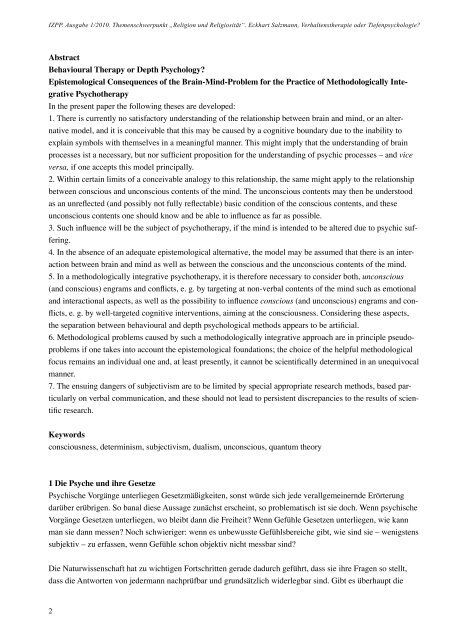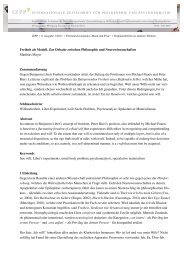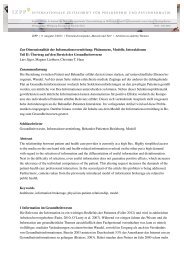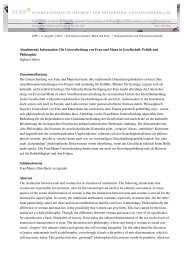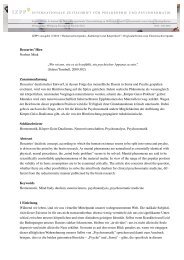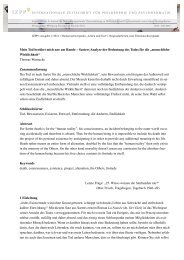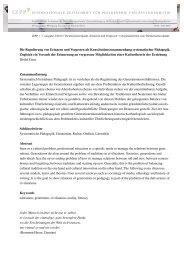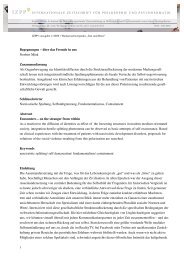Verhaltenstherapie oder Tiefenpsychologie? Erkenntnistheoretische ...
Verhaltenstherapie oder Tiefenpsychologie? Erkenntnistheoretische ...
Verhaltenstherapie oder Tiefenpsychologie? Erkenntnistheoretische ...
Sie wollen auch ein ePaper? Erhöhen Sie die Reichweite Ihrer Titel.
YUMPU macht aus Druck-PDFs automatisch weboptimierte ePaper, die Google liebt.
IZPP. Ausgabe 1/2010. Themenschwerpunkt „Religion und Religiosität“. Eckhart Salzmann, <strong>Verhaltenstherapie</strong> <strong>oder</strong> <strong>Tiefenpsychologie</strong>?<br />
Abstract<br />
Behavioural Therapy or Depth Psychology?<br />
Epistemological Consequences of the Brain-Mind-Problem for the Practice of Methodologically Integrative<br />
Psychotherapy<br />
In the present paper the following theses are developed:<br />
1. There is currently no satisfactory understanding of the relationship between brain and mind, or an alternative<br />
model, and it is conceivable that this may be caused by a cognitive boundary due to the inability to<br />
explain symbols with themselves in a meaningful manner. This might imply that the understanding of brain<br />
processes ist a necessary, but nor sufficient proposition for the understanding of psychic processes – and vice<br />
versa, if one accepts this model principally.<br />
2. Within certain limits of a conceivable analogy to this relationship, the same might apply to the relationship<br />
between conscious and unconscious contents of the mind. The unconscious contents may then be understood<br />
as an unreflected (and possibly not fully reflectable) basic condition of the conscious contents, and these<br />
unconscious contents one should know and be able to influence as far as possible.<br />
3. Such influence will be the subject of psychotherapy, if the mind is intended to be altered due to psychic suffering.<br />
4. In the absence of an adequate epistemological alternative, the model may be assumed that there is an interaction<br />
between brain and mind as well as between the conscious and the unconscious contents of the mind.<br />
5. In a methodologically integrative psychotherapy, it is therefore necessary to consider both, unconscious<br />
(and conscious) engrams and conflicts, e. g. by targeting at non-verbal contents of the mind such as emotional<br />
and interactional aspects, as well as the possibility to influence conscious (and unconscious) engrams and conflicts,<br />
e. g. by well-targeted cognitive interventions, aiming at the consciousness. Considering these aspects,<br />
the separation between behavioural and depth psychological methods appears to be artificial.<br />
6. Methodological problems caused by such a methodologically integrative approach are in principle pseudoproblems<br />
if one takes into account the epistemological foundations; the choice of the helpful methodological<br />
focus remains an individual one and, at least presently, it cannot be scientifically determined in an unequivocal<br />
manner.<br />
7. The ensuing dangers of subjectivism are to be limited by special appropriate research methods, based particularly<br />
on verbal communication, and these should not lead to persistent discrepancies to the results of scientific<br />
research.<br />
Keywords<br />
consciousness, determinism, subjectivism, dualism, unconscious, quantum theory<br />
1 Die Psyche und ihre Gesetze<br />
Psychische Vorgänge unterliegen Gesetzmäßigkeiten, sonst würde sich jede verallgemeinernde Erörterung<br />
darüber erübrigen. So banal diese Aussage zunächst erscheint, so problematisch ist sie doch. Wenn psychische<br />
Vorgänge Gesetzen unterliegen, wo bleibt dann die Freiheit? Wenn Gefühle Gesetzen unterliegen, wie kann<br />
man sie dann messen? Noch schwieriger: wenn es unbewusste Gefühlsbereiche gibt, wie sind sie – wenigstens<br />
subjektiv – zu erfassen, wenn Gefühle schon objektiv nicht messbar sind?<br />
Die Naturwissenschaft hat zu wichtigen Fortschritten gerade dadurch geführt, dass sie ihre Fragen so stellt,<br />
dass die Antworten von jedermann nachprüfbar und grundsätzlich widerlegbar sind. Gibt es überhaupt die<br />
2


